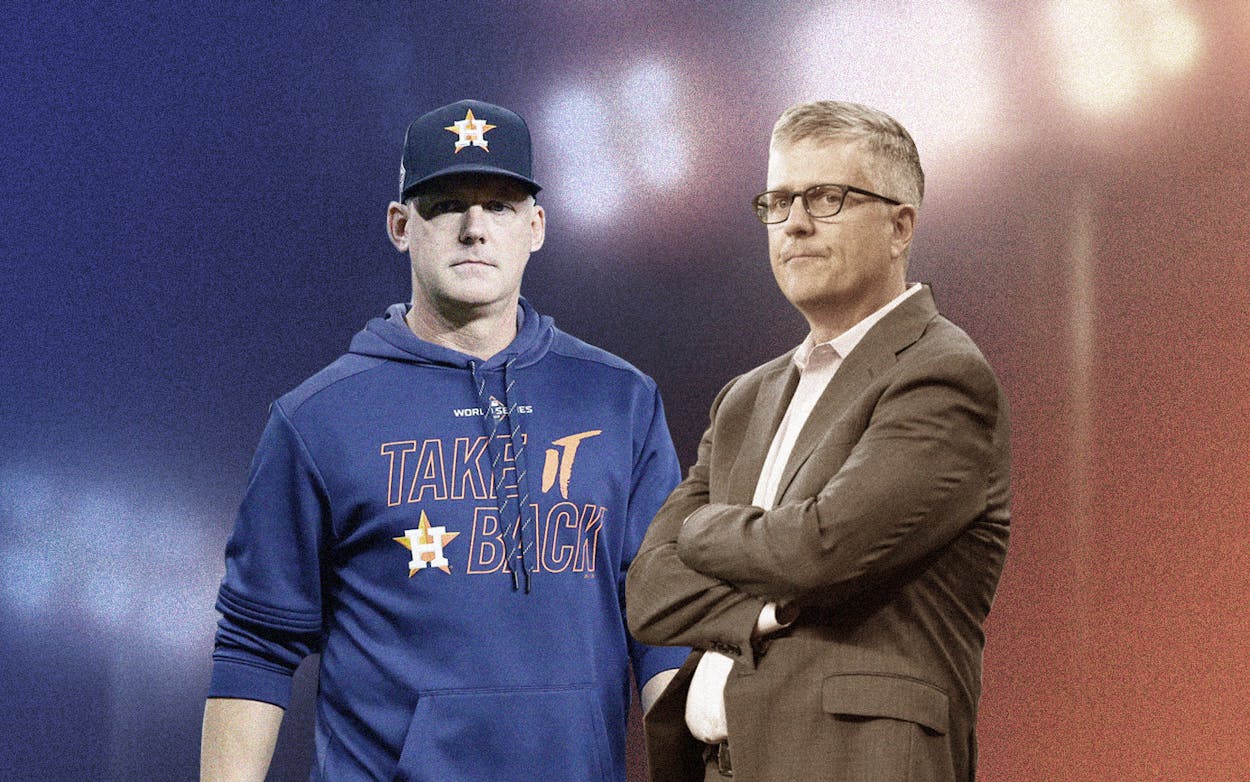In a tearful press conference this afternoon, the Houston Astros announced that they would be firing general manager Jeff Luhnow and manager A.J. Hinch. This doesn’t usually happen when a team has, in three consecutive years, won the World Series, played for the pennant in the American League Championship Series, and come within three innings of winning a second World Series. Normally, the leaders that get a team there get rewarded with greater power and more of a mandate to do whatever they want.
That’s not how it goes in Houston right now, though. (Houston sports leaders who want that kind of power need simply to trade away the team’s future and then squander a 24-point playoff lead.) Luhnow and Hinch were fired because they were very good at the job of winning games, and—according to an investigation conducted by Major League Baseball—one of the ways they did that was to cheat by stealing signs from rival teams. Along the way, the team built an unaccountable power structure that allowed executives like Brandon Taubman to display their contempt for critics of its processes, as MLB Commissioner Rob Manfred concluded in his summary of the investigation.
https://twitter.com/lindseyadler/status/1216800234526986241
The Astros’ sudden transformation from a lovable bunch of scrappy underdogs to the most reviled villains in baseball was essentially without precedent. The inevitable trajectory of underdogs in sports lends itself to a transition from face to heel—either die a hero or live long enough to see yourself become a villain, to quote The Dark Knight and also Jay-Z—but it happened quickly for the Astros. “They hate us cuz they ain’t us” is a common enough refrain from swaggering, successful sports teams, but it goes even deeper in Houston: the team is hated because they cheated, they lied, and they defended indefensible behavior.
But, you know, life goes on. The Astros will field a team in 2020—pitchers and catchers report on February 11!—and they need someone to lead it. Still, the organization is radioactive right now. In addition to losing its GM and manager, the Astros were also required to surrender their 2020 and 2021 first-and second-round draft picks, as well as pay a $5 million fine. Promoting from within will be hard—the investigation did not find many heroes in the Astros organization—and attracting top talent could well be impossible. No one who wants a good career in baseball would look at the Houston Astros on the week of January 13, 2020, and think, “Yep, that there is a good job.”
But I will do it. Someone, after all, has to lead the Astros, and while I don’t necessarily believe that I’m the most capable person to take on the task, I also promise not to steal signs, or to let unchecked execs blow up at groups of female reporters, or to sign a closer like Roberto Osuna to begin with. (Whoever does take the job will have to navigate that particular minefield, as the previous regime signed a one-year, $10 million deal with the pitcher last week.) I will, like anyone hired to manage the Astros, rely heavily on the talents of José Altuve, Justin Verlander, Carlos Correa, George Springer, and the rest of the roster. How poorly could a decision like this go? It’s an open-ended question, but if you compare it with how things have gone for the Astros since late October, the answer is, “Ehhh, not that bad!”
My qualifications for the role are admittedly thin. While I did play a small amount of Little League ball as a child, I was more of what you might call an “indoor kid.” But one reason why the Astros are in this mess is that they turned the entire organization over to the indoor kids. The Astros’ entire “trust the process” ethos was a way of training the organization’s fan base to celebrate the advanced data and analytics its leaders utilized, playing an extreme game of moneyball that looked at every player on the field like a set of stats rather than a human being, ultimately reducing even emotional favorites like Altuve to a balance on a ledger sheet. That wins games, but—to put it plainly—it sucks, and it’s no fun, and it turned the entire country into Washington Nationals fans during the World Series.
I don’t aspire to have a career in baseball, which is the strongest selling point I can offer for my services here. There will be a qualified leader at some point who will want to rebuild the Astros in their own image, and it will—we can only hope—not be one that’s so reprehensible that they’ll get thrown out on the heels of the three best seasons in team history. But that person shouldn’t go anywhere near the Astros right now. Anybody who wants a good job in baseball should be cautious about that organization.
So I will accept this heavy burden, simply so no one else has to. It’s a bad time to be an Astro right now, and the city of Houston deserves someone who doesn’t pretend that it’s anything else.








